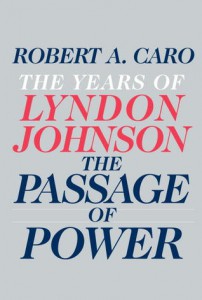Review: The Passage of Power
The Passage of Power by Robert A. Caro
My rating: 5 of 5 stars
I've been looking forward to this book, ever since I read Master of the Senate two years ago. I knew it would involve the Johnson presidency but not the entire thing. So, I wasn't quite sure what to expect when I finally picked it up.
The book covers Johnson's flawed and failed candidacy for the 1960 Democrat Presidential nomination and Johnson's experience on the Kennedy-Johnson ticket. It covers his 3 years, as Kennedy's Vice-President, and then his succession to the Presidency itself and what he did during his first 7 weeks in office—the time from Kennedy's assassination to the 1964 State of the Union address.
Telling you that doesn't really convey what the book is about though. Here, in Caro's words, is the center of the book.
[T]he succession of Lyndon Johnson deserves a better fate in history. For had it not been for his accomplishments during the transition, history might have been different. Because the headlines in that first blizzard of news—PRISONER LINKED TO CASTRO GROUP; SUSPECT LIVED IN SOVIET UNION—have long been proven false or exaggerated, it has been easy to forget that for several days after the assassination America was reading those headlines, easy to forget the extent of the suspicions that existed during those days not only about a conspiracy but about a conspiracy hatched in Cuba or Russia, two nations with whom, barely a year before, America had been on the brink of nuclear war.
... Nor should other aspects of the transition be passed over as lightly as they have been. Because he moved so swiftly and successfully to create the image of continuity that reassured the nation, it has been easy to overlook how the Kennedy men might simply have resigned. It has been easy to overlook the obstacles—the shock and mystery of the assassination, the mushroom cloud fears, the deep divisions in the country over his predecessor’s policies—that stood in the way of unifying America behind his Administration; easy to overlook how difficult to unify even his own party: to rally into line behind his Administration’s banner labor leaders, black leaders, liberals, many of whom had, for years, been deeply suspicious of him and who would have needed little excuse to fall irrevocably into line behind another, more familiar banner, the brother’s banner, that could so readily have been raised within party ranks; to fall into line behind a leader they knew, and were quickly beginning to love.
This book is the story of that transition. Everything else in the book is designed to set the stage for the transition. Caro wants you to understand, the man, the times, the place, and the history leading up to that transition.
In true Caro style, we get a mini-biography of President John F. Kennedy. We're treated to an up-close look at how Johnson lost his opportunity and 1960 and what he endured as Vice-President. But all of that is window dressing, to set the stage for the transition. Caro's focus on the transition is truly illuminating of both President Johnson and of how power is wielded in America.
This book was a shorter read than Master of the Senate and was truly engaging. I had trouble putting it down, once I started it, and was once again drawn into Caro's portrayal of this era of American history. Once again, I have to highly recommend Caro's work on Johnson. You won't regret reading it and you'll definitely learn from it.
This entry was tagged. Book Review Review
